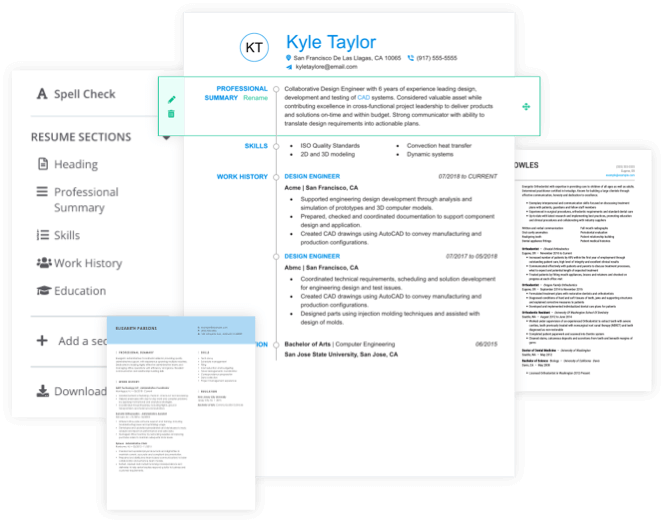- Featured in:

Surgery schedulers arrange the logistics of patient surgeries, setting the time and venue of procedures and taking care of paperwork and other administrative requirements. They serve as a liaison between patients and medical staff throughout the entire process, which covers pre-operative testing, authorizations for health insurance, the procedure itself, and follow-up appointments. All throughout, surgery schedulers communicate with patients and their families to ensure that they’re well informed and prepared. They also take on miscellaneous clerical tasks such as processing payments, taking phone calls, and verifying patient records. Typically employed by hospitals and healthcare facilities, they must be adept at multitasking and processing paperwork efficiently.
Studying resume examples is a great way to get inspiration for your own. Study our library of example today!
Want to boost your resume? Your Jobhero subscription comes with a complimentary cover letter builder. Once you choose a cover letter template, the builder will suggest job-specific skills and prewritten entries, allowing you to save multiple letters for various applications fast.
Surgery Scheduler Duties and Responsibilities
A surgery scheduler’s duties and responsibilities vary slightly based on their employer. We analyzed job descriptions to come up with the following list of core duties and responsibilities:
Schedule Procedures and Appointments
It’s up to surgery schedulers to set the time and date for surgical procedures, diagnostic tests, and pre-operation and follow-up appointments based on patient needs and the availability of medical staff. They enter these details into a computerized system, which they maintain and update when schedule changes occur.
Manage Paperwork
Before they can undergo surgery, patients need to submit insurance-related paperwork such as pre-authorizations and forms indicating their consent and personal and medical information. Surgery schedulers are responsible for gathering these forms and ensuring that all paperwork is complete before the procedure.
Assist Patients
Surgery schedulers thoroughly communicate instructions regarding procedures to patients, from reminding them about important dates to explaining the recovery period afterwards. They answer procedure-related inquiries and maintain a polite, respectful attitude toward patients and their families all throughout.
Coordinate with Medical Staff
For a surgery to proceed successfully, surgery schedulers must coordinate with various medical staff, including physicians, nurses, anesthesiologists, and laboratory technicians, as well as insurance companies and even other clinics. In addition, they must secure special equipment and surgical materials and immediately communicate problems to the proper personnel.
Handle Administrative Tasks
Surgery schedulers handle several administrative tasks. Among the most common are gathering patient details, verifying billing and insurance information, collecting payments prior to surgery, and scheduling department events. They also answer phone calls, orienting new patients and providing available appointment dates.
Surgery Scheduler Skills and Qualifications
Organized and meticulous, surgery schedulers have a sharp eye for detail. They exhibit a tactful, professional attitude toward patients and can juggle several tasks at the same time, adapting easily to circumstances and changes in schedules. Employers prefer candidates who possess the following skills:
Organization skills – since surgery schedulers must keep track of various procedures and choose time slots that are agreeable to both patients and medical staff, they must be organized and detail oriented. They should also be comfortable with paperwork
Knowledge of medical terminology – patients often look to surgery schedulers for basic guidance, so surgery schedulers must be familiar with medical terminology and the core steps of surgical procedures
Communication skills – surgery schedulers must be excellent communicators who can give patients a clear idea of what to expect and how to prepare for a procedure. Aside from this, they must relay information correctly to medical staff and insurance companies
Data entry – it’s essential for surgery schedulers to be fast and accurate with data entry, as they must note down schedules and fill out forms and charts for all patients
Empathy – surgery schedulers may deal with patients who are anxious, discouraged, or in emotional distress, so they must be empathetic and considerate when addressing inquiries and requests
Tools of the Trade
Surgery schedulers should be familiar with several tools, including:
Medical scheduling software (TotalMD, PracticeSuite, PrognoCIS)
Documentation tools (patient charts, forms, whiteboards)
Surgery Scheduler Education and Training
The minimum education requirement for surgery schedulers is a high school diploma, although taking additional courses related to healthcare can be useful. Employers look for candidates with at least one year of experience in a medical setting, preferably with surgery scheduling or administrative tasks. Candidates can expect a brief period of on-the-job training, where they will learn about patient protocol, surgical procedures, and scheduling software.
Surgery Scheduler Salary and Outlook
According to PayScale, the average hourly salary for surgery schedulers is around $16.44 per hour. The top 10 percent of surgery schedulers make upwards of $21 hourly, while the bottom 10 percent earn around $13. On a yearly basis, a surgery scheduler’s salary ranges from $27,000 to $46,000.
The Bureau of Labor Statistics (BLS) reports a high employment growth rate of 22 percent for medical secretaries, including surgery schedulers, through 2026. This is in contrast with the decline in jobs for secretaries and administrative assistants in general. Medical secretaries are outliers because of increasing demand for healthcare.

Helpful Resources
Association for Healthcare Administrative Professionals
this nationwide organization caters to administrative assistants, medical secretaries, and other professionals who support healthcare leaders. Look through its website to access a basic healthcare glossary, a job board, and curated links to online courses, useful tools, and training programs
Concise Medical Dictionary (Oxford Quick Reference)
lauded by reviewers and medical journals, this reference guide comes with more than 12,000 A-Z entries covering diverse medical science topics, complete with illustrations and suggested web links
American Association of Healthcare Administrative Management
AAHAM is a community for professionals who are interested in the administrative aspects of healthcare, including medical records, data management, and patient relations. It emphasizes professional development and features events, certification programs, and networking opportunities
Handbook for Hospital Secretaries and Receptionists
written by a medical administrator, this book offers a well-rounded introduction to the job functions of hospital secretaries and tackles hospital departments, medical specialties, and report writing




